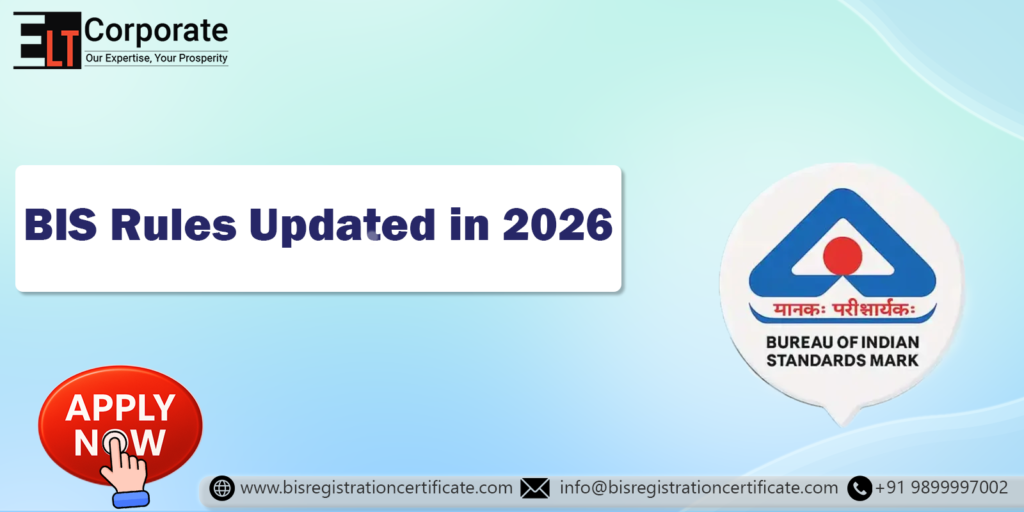If you’re a manufacturer, importer, or business owner in India, staying compliant with the Bureau of Indian Standards regulations is crucial. In 2026, BIS introduced several important updates that affect a wide range of products, from industrial machinery and home appliances to jewellery, furniture and cookware. These changes aim to improve product safety, consumer protection, and overall quality in the Indian market.
In this blog, we’ll explore the latest BIS rule updates, their impact on business, and what you should do to stay compliant.
1. Major Expansion of Indian Standards
Between March and May 2026, BIS rolled out or updated over 200 Indian Standards. These updates span multiple sectors, including:
- Medical devices (like implants and anaesthetic equipment)
- Electrical and electronic equipment
- It management system
- Waste management
- Packing and safety items
The received standards are now mandatory after a transition period ending September 17, 2025. That means manufacturers and suppliers must stop using the old versions and comply with the updated ones.
2. Machinery & Electrical Equipment Now Need BIS Certification
In a major move, the Indian government introduced Othe mnibus Technical Regulations (OTR) to cover industry machinery and electrical components. Starting August 28, over 400 products across 90 + Indian Standards will now require BIS certification.
This includes:
- Pumps
- Cranes
- Switchgear
- Textile and industrial machines
- Electrical sub-assemblies
Manufacturers (including foreign ones) must apply online via the Manakonline portal. If you’re importing such items, you’ll also need to appoint an Authorised Indian Representative.
3. Footwear,Furniture & More Under Mandatory BIS
Another big update: BIS certification has now been extended to footwear and furniture. This will be mandatory from early 2026, with phased timeline for MSMEs.
Other products added under mandatory certification include:
- Stainless steel seamless pipes and tubes (Effective: August 1, 2025)
- Flashlights and hinges (Effects: July 2025)
These changes ensure that even everyday consumer goods meet quality and safety standards.
4. New Hallmarking Rules for Gold and Silver
In July 2025, BIS brought 9-karat gold under the scope of mandatory hallmarking. This joins the previously mandatory categories of 14K, 18K, 22K and 24K.
Additionally, there’s growing demand from jewellers to allow self-hallmarking of silver items, which could reduce costs and improve compliance. These discussions are still ongoing, but a rule change may follow soon.
5 . Aluminium Cookware Now Has Expired & Labelling Rules
One of the most consumer-focused changes of 2025 is for aluminium. As per new BIS guidelines:
- Aluminium pots, pans, and pressure cooker must now have clear expire recommendation (12-24 months of use)
- The maximum limits of heavy metals like lead, mercury, and cadmium are now regulated.
- Manufacturers must clearly label the grade of aluminium used.
Small enterprises have until July 2025 to comply, while micro units get time until October 2025.
6. How Do These Changes After Foreign Manufacture?
If you’re foreign company exporting to India, the BIS updates mean sticker documentation and timeline, You’ll need:
- FMCS certification for ISI marked products
- Or compliance under Scheme X for machinery/electrical components
You must:
- Appoint an Authorised Indian Representative
- Undergo a factory audit
- Submit samples for testing at BIS-approved labs
- Complete the process before the enforcement date
The certification cost can range from USD 8,000 to 30,000. Depending on product’s type and complexity.
7. Key Deadlines to Keep in Mind
Here are the most important dates related to the 2026 BIS update:
| Requirement | Deadline |
|---|---|
| Use of old standards ends | September 17, 2025 |
| Machinery certification under OTR | August 28, 2025 |
| Steel pipes & tubes BIS deadline | August 1, 2025 |
| Hinges & flashlights QCO enforcement | July 2025 |
| Aluminium cookware rules (small units) | July 2025 |
| Aluminium cookware rules (micro units) | October 2025 |
| 9K gold hallmarking starts | July 2025 |
| Furniture & footwear BIS rollout | Early 2026 |
What Should Businesses Do Now?
Here’s how you can prepare for the 2025 BIS changes:
- Audit your product list – Are you selling any items that now fall under BIS rules?
- Start the certification process early – Don’t wait until the last minute.
- Update your labels and packaging, especially for cookware and electronics.
- Replace outdated inventory, especially those that are non-compliant with heavy metal limits or lack hallmarking.
- For foreign exporters – Get in touch with a reliable AIR in India to handle certifications smoothly.
Conclusion
The 2025 BIS update marks a significant shift toward quality, Safety, and transparency in the Indian market. Whether you‘re a local manufacturer or a global supplier, now is the to align your products with these new standards. Adapting early will not only ensure regulatory compliance but also build stronger consumer trust and long-term market presence.
Need help navigating BIS certification? Our team at ELT Corporate can guide you through the process—from application to product testing and compliance documentation.
What are the key BIS updates in 2025?
New Quality Control Orders (QCOs) were introduced for footwear, furniture, chemicals, and machinery with mandatory certification deadlines.
Is hallmarking mandatory for 9K gold in 2025?
Yes, from July 2025, 9-karat gold is included under mandatory hallmarking in India.
What changes affect aluminium cookware under BIS 2025 rules?
BIS now requires labelling of aluminium grade and recommends replacing cookware every 12–24 months.









